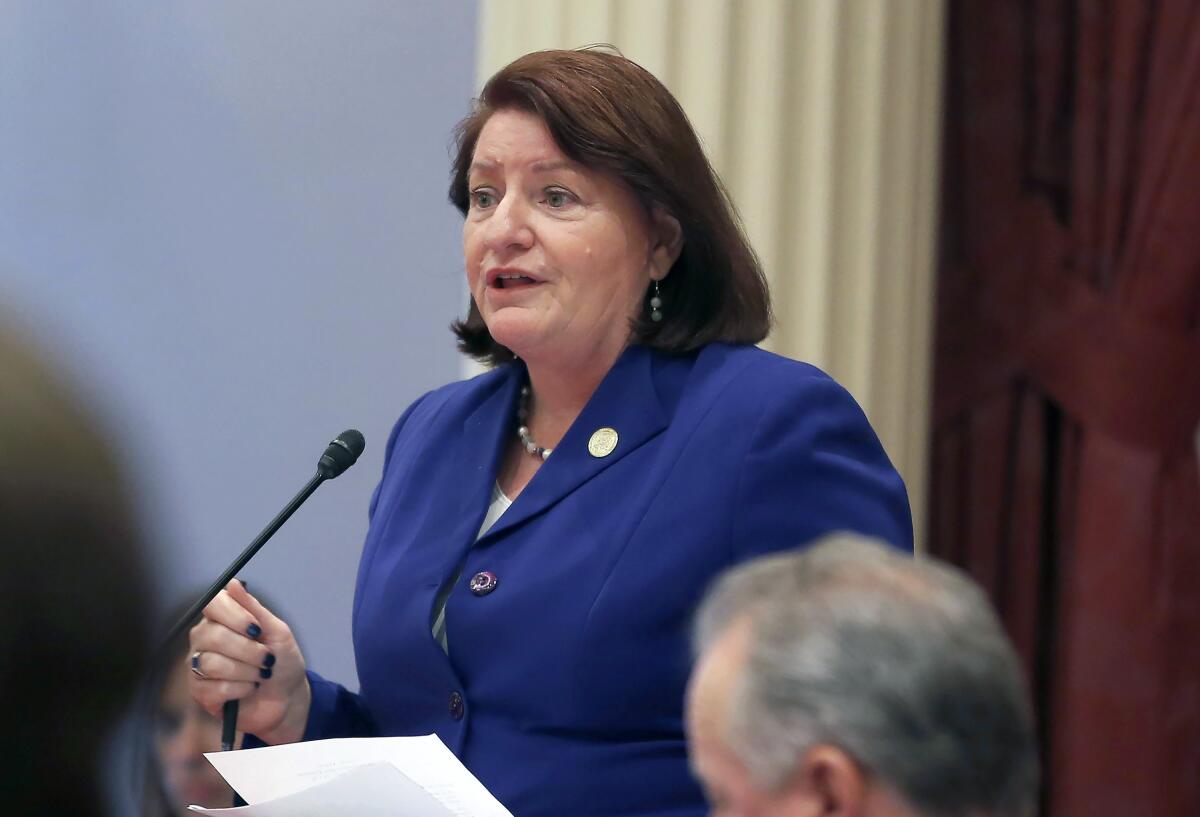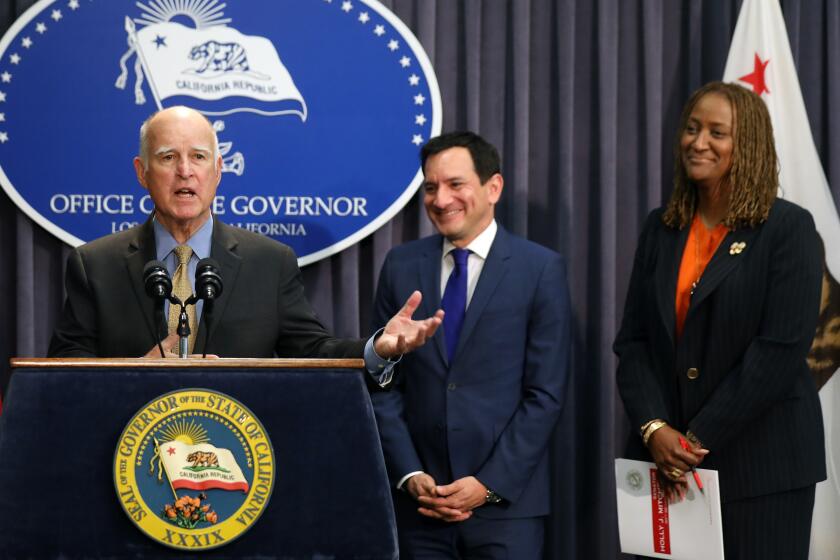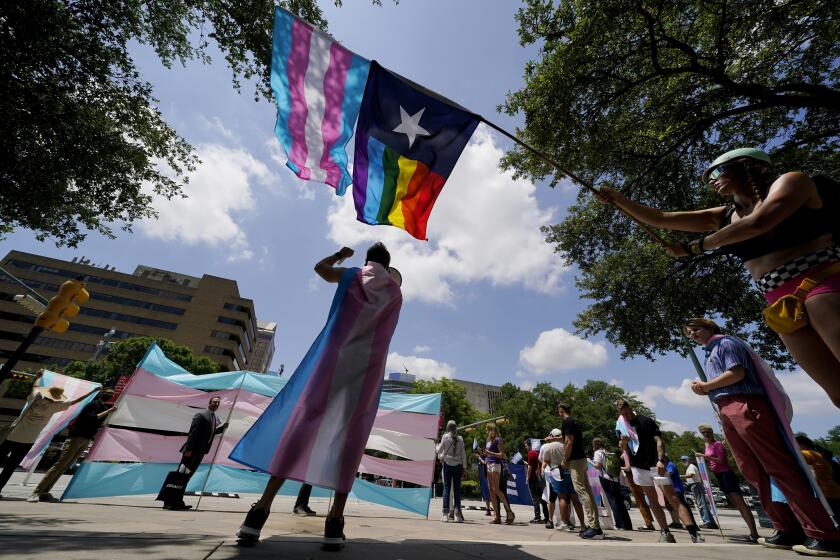Democratic leader wants California to repeal ban on government travel to anti-LGBTQ states

- Share via
SACRAMENTO — In a state Capitol dominated by Democrats, where expanding LGBTQ rights is a pillar of the agenda, an announcement Wednesday from one of the most powerful lawmakers came as something of a shock:
Senate leader Toni Atkins — a San Diego Democrat who has blazed trails as a lesbian lawmaker and the first woman to lead both houses of the Legislature — said she wants California to repeal its ban on government-funded travel to states with anti-LGBTQ laws.
Atkins has introduced legislation to repeal the law she and her colleagues passed in 2016 with the encouragement of major gay-rights groups, who argued that an economic boycott by the state would “ensure that California tax dollars do not help finance discrimination beyond our borders.”
Instead, Atkins said she wants California to create a publicity campaign in red states that would encourage LGBTQ acceptance. Her bill would create a fund supported by private donors and possibly taxpayers that could pay for nonpartisan messages that discourage discrimination and help LGBTQ people feel less isolated.
“I know from personal experience growing up in a rural community, where it is more conservative, that the way to change people’s minds is to have impact and direct contact and to open hearts and minds,” Atkins said in a call with reporters, describing her childhood in rural Virginia.
“Polarization is not working,” she said. “We need to adjust our strategy.”
Although Atkins said California’s travel ban had been successful in sending a message that the Golden State opposes states’ discriminatory laws, her move to repeal it is a tacit acknowledgment that the ban has not worked as intended.
Three years after the Legislature banned taxpayer-funded travel to 10 states with ‘anti-LGBTQ’ laws, lawmakers and athletic teams are still going.
Instead of stopping travel to states with anti-LGBTQ laws and creating an economic hit that might spur them to change, it generated a host of work-arounds. California politicians continued traveling to banned states by using campaign funds instead of tax dollars. Sports teams from public universities turned to private boosters and corporate sponsors to get the money needed to compete in states on the no-go list.
Meanwhile, as state laws discriminating based on gender identity or sexual orientation have become even more common across the nation, the list of prohibited states has grown from four when Gov. Jerry Brown signed the law to 23 today.
Having nearly half the country off-limits for government-sponsored travel became a problem for many scholars at public universities who found themselves blocked from conducting research and delivering presentations across the nation. The American Historical Assn. wrote a letter to California lawmakers in 2021 asking for a change to the legislation.
“We are especially concerned that this boycott restricts the work of graduate students and early career scholars, preventing them from completing research that would actually showcase the significance of LGBTQ life, among other pressing subjects, in targeted states,” the historians wrote.
The drumbeat grew louder in December when the New York Times published an op-ed blasting California’s travel ban.
It’s riddled with loopholes and has been ineffective at stopping red states from passing discriminatory laws.
“Many policies — including those that focus on food security, health insurance, taxation and road safety — are regulated at the state level. Why doesn’t California see value in funding research into what other states might be doing in those areas?” wrote Aaron Carroll, chief health officer of Indiana University.
“Does California really believe its housing policies, and those who make them, might not benefit from some travel to other states to see what they might be doing better?”
Atkins recognized the “unintended impact” California’s ban has had by hampering some academic research and athletic opportunities for college students. She also said it’s left LGBTQ people in red states even more isolated, and made it harder for California lawmakers to share their progressive agenda with policymakers across the nation.
“We should, as legislators who have put forward the most LGBTQ-friendly, reproductive rights, racial justice bills, we should be in all of those states to be able to share our experience,” Atkins said.
Atkins’ push comes as San Francisco also considers repealing a similar local ordinance that prohibits city employees from traveling to 30 states with laws limiting LGBTQ rights, voting rights and abortion access. The San Francisco law goes even further by also banning contracts with companies based in those states. City officials found the policy has been “ineffective and cumbersome,” the San Francisco Chronicle reported last month, adding costs and complexity to city business.
Whether Atkins’ bill will gain support from a majority of California lawmakers remains to be seen. Gay-rights advocates have historically defended the importance of the travel boycott. The law was written by Assemblyman Evan Low (D-Campbell), who is still in office. And the Legislature this year includes more LGBTQ lawmakers than ever.
Equality California, a gay-rights group that pushed for the travel ban in 2016, issued a noncommittal statement saying, “We are in active discussions with [Atkins] and other members of the LGBTQ caucus about this bill and appreciate the need to be even more proactive and present in states that are passing anti-LGBTQ+ legislation.”
But if anyone can make the case that communicating with red state voters is a better way to advocate for gay rights than banning travel to red states, Atkins is the lawmaker best positioned to do so. The daughter of a miner who grew up in rural Virginia in the 1960s, Atkins said many of her family members are conservative Christians who changed their views on LGBTQ rights after she came out to them.
She moved to San Diego in 1985 and, after a career in local politics and women’s health advocacy, won a seat in the Assembly in 2010. Four years later, she kissed her wife Jennifer LeSar on the Assembly dais as she was sworn in as California’s first lesbian Assembly speaker.
More to Read
Sign up for Essential California
The most important California stories and recommendations in your inbox every morning.
You may occasionally receive promotional content from the Los Angeles Times.













